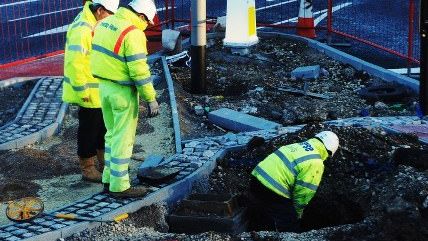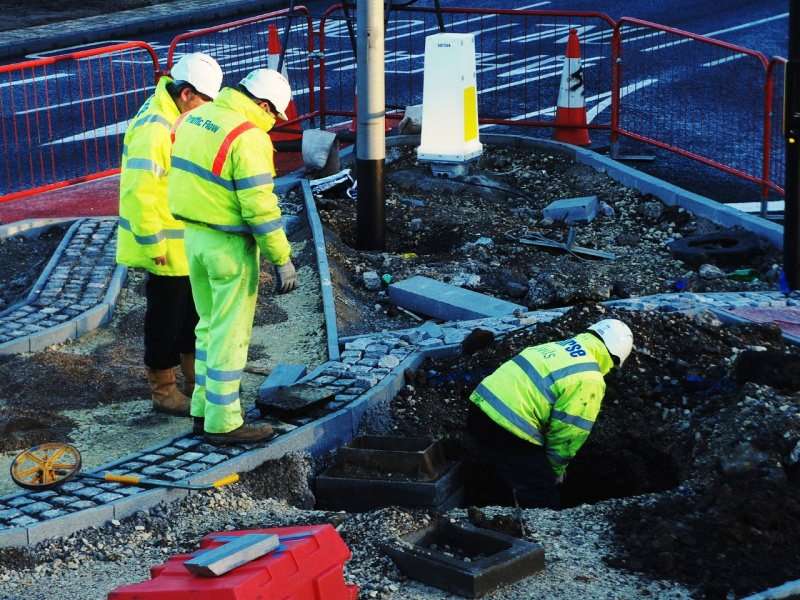L.A.'s Terrible Streets Are Because of Bad Management, Not Lack of Money


Yes, that's probably the most obvious headline I have and possibly will ever write for Reason. But an audit from the city controller's office actually quantifies it: The street department for Los Angeles is a mess that isn't repairing streets properly, isn't keeping decent records, and isn't collecting some fees it's supposed to be collecting, costing the city $190 million over 16 years. The Los Angeles Times gave Controller Ron Galperin space for a commentary explaining why things are so terrible:
The streets bureau also does not always prioritize its repair work based on common-sense criteria such as traffic volume, heavy vehicle loads and mass-transit loads. So despite the slurry work that's taken place, some of the city's busiest and most important thoroughfares remain in the worst condition, impeding traffic and commerce, making bike riding unsafe and turning bus rides into bumpy, uncomfortable journeys.
Our auditors also found that the Bureau of Street Services has undercollected $190 million in fees from utility companies that cut and dig into our streets, money that could have been used to perform miles of repairs. Likewise, between 2011 and 2013, it did not fully utilize its budgeted funds. Auditors found that $21 million earmarked for street repairs was returned to various funding sources unused. And the city has also spent more to produce its own asphalt than it would have if it had paid a vendor for it.
I can personally vouch for the weird road repair priorities. My own street and a few others in my neighborhood were resealed with slurry work last year. But the most traveled streets nearby that were in much worse repair remain completely untouched, so I have to drive several blocks navigating crumbling, bumpy avenues, only to turn onto my lovely street and drive about 100 smooth feet before hitting my driveway.
And note who the city isn't getting fees from? This isn't a case of blaming truck drivers for tearing up roads or other anti-private transportation arguments. Nor is it rich, evil tech corporations not paying their "fair share." It's because of utility companies not paying fees back for literally tearing up the roads to do work. (And you have to wonder what sort of work they're doing given the massive water main disaster that struck Los Angeles this week and flooded UCLA.)
As for the asphalt production, a companion news story at the Times notes that the difference in price between the city and a private asphalt producer is more than a 50 percent increase: $66 per ton versus $40 per ton.
Oh, and some of that unused $21 million was apparently federal stimulus funds. You know, for those "shovel-ready" projects?
In March, city advisors wanted to try to push through another tax increase to try to generate more revenue to repair the roads. That idea has been abandoned for now:
"Right now, people want to know with a sense of confidence that the money that we are spending is being properly spent," Galperin said Thursday at a news conference announcing the audit's findings. "And until that happens, I think people are going to be very reluctant -- and correctly so -- to say, 'Let's just throw more money at it.'"
Editor's Note: As of February 29, 2024, commenting privileges on reason.com posts are limited to Reason Plus subscribers. Past commenters are grandfathered in for a temporary period. Subscribe here to preserve your ability to comment. Your Reason Plus subscription also gives you an ad-free version of reason.com, along with full access to the digital edition and archives of Reason magazine. We request that comments be civil and on-topic. We do not moderate or assume any responsibility for comments, which are owned by the readers who post them. Comments do not represent the views of reason.com or Reason Foundation. We reserve the right to delete any comment and ban commenters for any reason at any time. Comments may only be edited within 5 minutes of posting. Report abuses.
Please to post comments


Well, if they had more money, they'd be able to afford better managers.
See, I've run rings around you, logically.
Fire the current management first, then we can talk.
This isn't a case of blaming truck drivers for tearing up roads
I the road problem in LA was because global warming caused a major fault line to appear beneath the city.
My own street and a few others in my neighborhood were resealed with slurry work last year. But the most traveled streets nearby that were in much worse repair remain completely untouched, so I have to drive several blocks navigating crumbling, bumpy avenues, only to turn onto my lovely street and drive about 100 smooth feet before hitting my driveway
That sounds eerily similar to Baltimore City streets.
But the most traveled streets nearby that were in much worse repair remain completely untouched
The Chamber of Commerce and City sales tax collections has a lot to do with how the priorities set. Typically, they would rather have all lanes open no matter how bad they are, rather than put up with half the capacity while the roads are fixed. half-capacity roads = less shoppers = less sales tax collected. Therefore, the most heavily traveled roads in shopping areas are usually the lowest priority.
In the area of Chicago I live in, road projects near shopping areas are begun in February and must be completed by the beginning of August. Back-to-School and Xmas shopping cannot be disrupted.
They could work on them at night, in small batches?.
Heh.
They do do on those roads at night. It's amazing how government can actually be productive when revenue is threatened.
Well, now, Scott, you just don't have the same priorities as LA. They spend $650 million a year on welfare for parents of illegal aliens, so there's not much left over for frivolities like roads.
Same kind of whacky prioritization occurs in Denver. Gov planners do not seem to factor driver's lost time or damaged vehicles or frayed nerves into any equation. Gus in Denver
But we need to tax the rich because...ROADZ.